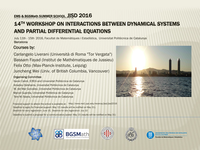JISD2016
14th
WORKSHOP ON INTERACTIONS BETWEEN DYNAMICAL SYSTEMS AND
PARTIAL DIFFERENTIAL EQUATIONS (JISD2016)
 |
EMS SUMMER SCHOOL |
|---|
JORNADES D'INTERACCIÓ ENTRE SISTEMES DINÀMICS I EQUACIONS EN DERIVADES PARCIALS
Barcelona, July 11 - 15, 2016
- Contents - Schedule - Seminars - Communications - Posters - Participants
The 14th edition of the WORKSHOP ON INTERACTIONS BETWEEN DYNAMICAL SYSTEMS AND PARTIAL DIFFERENTIAL EQUATIONS (JISD2016) will be held in Barcelona, July 11 - 15, 2016, at the Universitat Politècnica de Catalunya (UPC)
Lecturers of courses in former JISD editions
There will be four main courses of six hours each, some seminars, communications, and posters. The courses will be taught within the Master of Science in Advanced Mathematics and Mathematical Engineering (MAMME) of the UPC Graduate School. This is one of the Barcelona Graduate School of Math (BGSMath) scientific Activities for 2016.
Lecturers:
- Carlangelo Liverani (Università di Roma "Tor Vergata")
- Bassam Fayad (Institut de Mathématiques de Jussieu)
- Felix Otto (Max-Planck-Institute for Mathematics in the Sciences, Leipzig)
- Juncheng Wei (University of British Columbia, Vancouver)
One hour seminars by:
- Gyula Csato (Univ.)
- Peter de Maesschalck (Univ)
-
Supported by FME, UPC
| Organizers - Xavier Cabré - Amadeu Delshams - Maria del Mar González - Marcel Guàrdia - Tere M. Seara Scientific Committee - Susanna Terracini - Jean Pierre Eckman - Scott Armstrong - Jean-Michel Roquejoffre |
|
|---|
Early registration fee: 200 euros.
Late registration fee: 250 euros.
There will be some *financial support* available for this edition.
Deadline to apply for financial support: May 15 (results will be notified on may 31).
Deadline for early registration: June 15.
Deadline for late registration: July 10.
Deadline to apply to give a communication/present a poster: May 15 (results will be notified on May 31).
REGISTRATION FORM 14th JISD'2016 CLOSED
NEWS: Bank account to pay conference registration JISD2016
*2100 0655 78 0200369725*. / *IBAN: ES52 2100 0655 7802 0036 9725* / *SWIFT: CAIXESBBXXX*
with the subject "JISD'16_lastname"
Please, when you made the transfer, send a copy of payment (pdf by e-mai)
with your name to Mireia Pasalamar at ecorec7.utgaeib@upc.edu
Contents
Courses will be held in the room S02 of the FME building (Facultat de Matemàtiques i Estadística), at C/ Pau Gargallo, n. 5 Barcelona, 08028.
| Course | Abstract |
Deterministic NoiseCarlangelo Liverani (Università di Roma "Tor Vergata") |
In the common usage there exists a dichotomy between deterministic and random behaviour. In this lecturers I will discuss how random behaviour can arise in a deterministic system. The emphasis will not be on generalities and philosophy but, rather, on the quantitative analysis of simple, but far from trivial, examples. |
| Ergodic theory of group actions on homogeneous spaces and applications to probabilistic Diophantine approximations Bassam Fayad (Institut de Mathématiques de Jussieu)Syllabus
|
The Diophantine properties of linear forms are related to the divergence rate of some trajectories of diagonal flows on homogeneous spaces through what can be called Dani's correspondence principle. Through the study of the ergodic theory of some particular actions on homogeneous spaces we will study the statistical behavior of Kronecker sequences and other linear forms evaluated modulo one. |
Stochastic partial differential equationsFelix Otto (Max-Planck-Institute for Mathematics in the Sciences, Leipzig)Syllabus |
In this course, I'd like to present some ideas to establish regularity for nonlinear parabolic differential equations driven by an irregular right-hand-side, as for instance modelled by noise. I'll focus on a situation where the roughness of the noise and the type of the nonlinearity are such that on the one hand, there is no need for a renormalization, but on the other hand, there is no straightforward perturbative argument. This seems the case for the one-dimensional equation ∂t u - ∂x2 π (u) =ξ
where the noise ξ is white in space and time, and the nonlinearity π(u) is uniformly elliptic in the sense of λ≤π'(u)≤ 1. Here, the goal is to show that with overwhelming probability, the solutions $u$ have the same regularity as in the linear case, which is Hölder continuity with exponent arbitrarily close to ½ in space (and ¼ in time).In this treatment, I'd like to focus on two tools beyond the more standard Martingale arguments. One the one hand, refined tools from the theory of linear equations with inhomogeneous coefficients, like Campanato's approach to Schauder theory and Nash's result on Hölder regularity, allow for a quite deterministic treatment. On the other hand, probing the sensitivity of the solution w. r. t. to the noise ξ, as encoded by the Malliavin derivative, allows for a powerful application of the concept of concentration of measure as a substitute for Gaussianity in the nonlinear case. This is based on recent work with Hendrik Weber. |
An introduction to gluing methodsJuncheng Wei (University of British Columbia, Vancouver)References of Lecture Notes of Prof. WeiSyllabus
|
I will introduce both finite and infinite dimensional gluing methods, and their applications in nonlinear Schrodinger equations, De Giorgi conjecture of Allen-Cahn, critical exponent problems, Liouville equations, Ginzburg-Landau, and many others. |
| Seminars | Abstract |
|
Gyula Csato (Univ.)
S |
T. |
| - Peter de Maesschalck (Univ) U |
T. |
(*) For further details, please contact: marcel.guardia .at. upc.edu / rosa.maria.cuevas .at. upc.edu
RMC-14-07-2016


Comparteix: